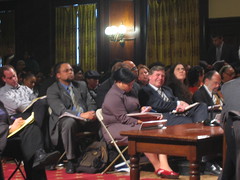This is the second in a series of posts on charter schools inspired by the excellent, recent law review article by my friend professor Mark Weber. You can read the first post in this series here. Professor Weber's article may be found here.
The number of charter schools is clearly on the upswing. In fourteen communities mo
 Image by gothamschools via Flickr
Image by gothamschools via Flickr
For those of you who like research, there has been some research on charter schools, and of course a few controversies. This link will take you to a study by Caroline Hoxby and others about New York City's charter schools. This link will take you to a review critical of the methodology used in the Hoxby study. This link will take you to the national study by CREDO at Stanford University released in June which finds that the
the achievement levels at charter schools is about the same as that of students who do not attend charters. Are charter schools better than other schools?
Because it appears that charter schools are likely to be the next big thing, Professor Weber's article takes on added importance. One of the important principles that his article identifies involves procedural safeguards. If a special education student attends a non-private charter school, he and his parents are still entitled to all the procedural safeguards established by IDEA. This issue is near and dear to my heart inasmuch as I am a mediator and hearing officer and a consultant to states on dispute resolution systems. Procedural safeguards are an important part of the special education law, and how they are enforced in the charter school setting may make for some new law.
One difficult issue will involve who is the defendant. For the most part, IDEA places the responsibility upon local educational agencies (LEAs) to provide a free and appropriate public education to a child with a disability. This can become tricky with charter schools because sometimes they are themselves the LEA and sometimes the local school district is the LEA. So the charter school or the school district, or possibly both, can be the ones getting sued and providing the relief. Of course, if the charter school is a private school, procedural safeguards only come into play under limited circumstances (involving proportionate share and child find/evaluation), but that is way beyond the scope of today's topic.
So as with all changes, the legal knots will undoubtedly follow. Any ideas on other problems with these issues?
the achievement levels at charter schools is about the same as that of students who do not attend charters. Are charter schools better than other schools?
Because it appears that charter schools are likely to be the next big thing, Professor Weber's article takes on added importance. One of the important principles that his article identifies involves procedural safeguards. If a special education student attends a non-private charter school, he and his parents are still entitled to all the procedural safeguards established by IDEA. This issue is near and dear to my heart inasmuch as I am a mediator and hearing officer and a consultant to states on dispute resolution systems. Procedural safeguards are an important part of the special education law, and how they are enforced in the charter school setting may make for some new law.
One difficult issue will involve who is the defendant. For the most part, IDEA places the responsibility upon local educational agencies (LEAs) to provide a free and appropriate public education to a child with a disability. This can become tricky with charter schools because sometimes they are themselves the LEA and sometimes the local school district is the LEA. So the charter school or the school district, or possibly both, can be the ones getting sued and providing the relief. Of course, if the charter school is a private school, procedural safeguards only come into play under limited circumstances (involving proportionate share and child find/evaluation), but that is way beyond the scope of today's topic.
So as with all changes, the legal knots will undoubtedly follow. Any ideas on other problems with these issues?
